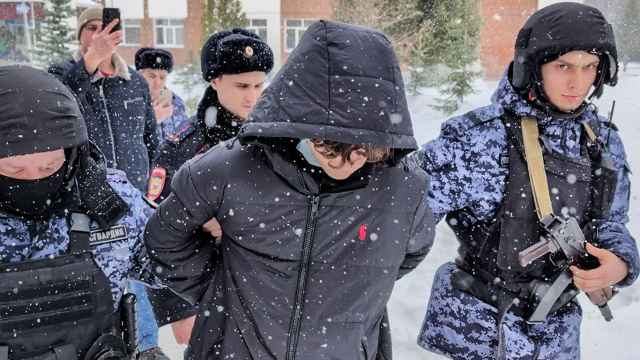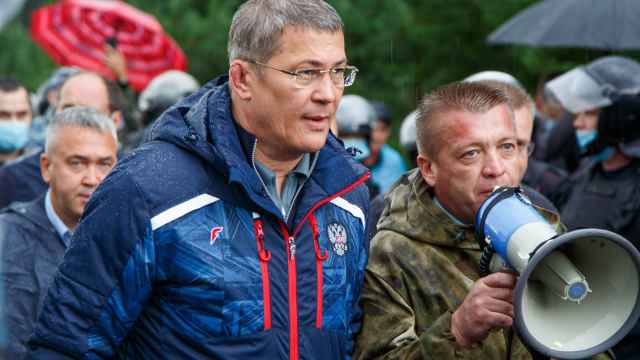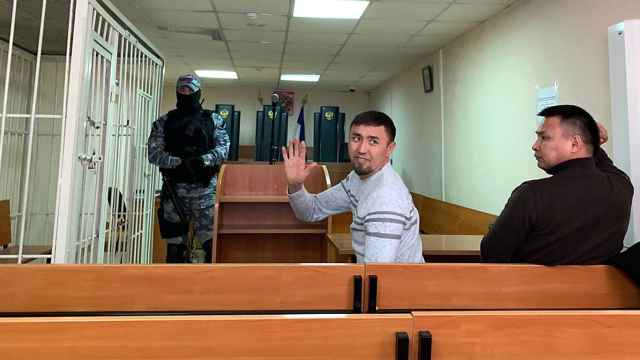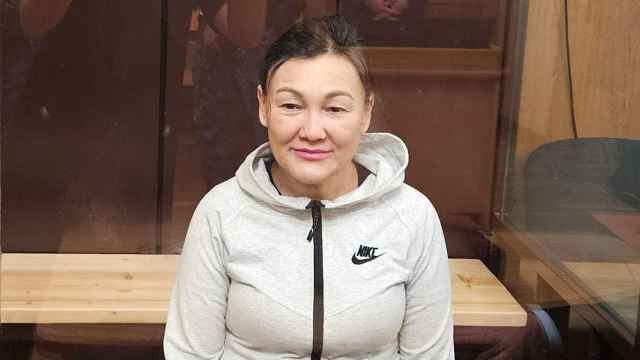The Supreme Court of Russia’s republic of Bashkortostan has rejected activist Fayil Alsynov’s appeal against a prison sentence on charges of “inciting interethnic hatred,” his lawyer Ilnur Suyundukov announced Thursday.
Alsynov, a prominent indigenous rights defender from Turkic-majority Bashkortostan, was sentenced to four years in a penal colony in January on charges linked to his role in protests against illegal gold-mining works in the republic’s southeast.
The republic’s highest court upheld the earlier verdict by the Baymaksky District Court and also ruled to ban the activist from administering websites and participating in mass gatherings for two-and-a-half years, local news outlet Aspekty reported.
“The reaction to Fayil's sentence is restrained — expecting his release would be naive, and in this case, it's probably good that they gave ‘only’ four years,” a representative of Bashqort Solidarity, an umbrella organization uniting ethnic Bashkir and Bashkortostan-born activists worldwide, told The Moscow Times.
Many in Bashkortostan consider the case against Alsynov, 37, to be a government-sanctioned vendetta for his enduring popularity in the republic — a belief that triggered large protests in his support.
Thousands gathered outside the court in the southeastern town of Baymak when the initial verdict in Alsynov’s case was handed down in January. Riot police used smoke grenades, tear gas and batons to disperse the peaceful crowd, which was also infiltrated by provocateurs who threw snowballs at the heavily equipped security service.
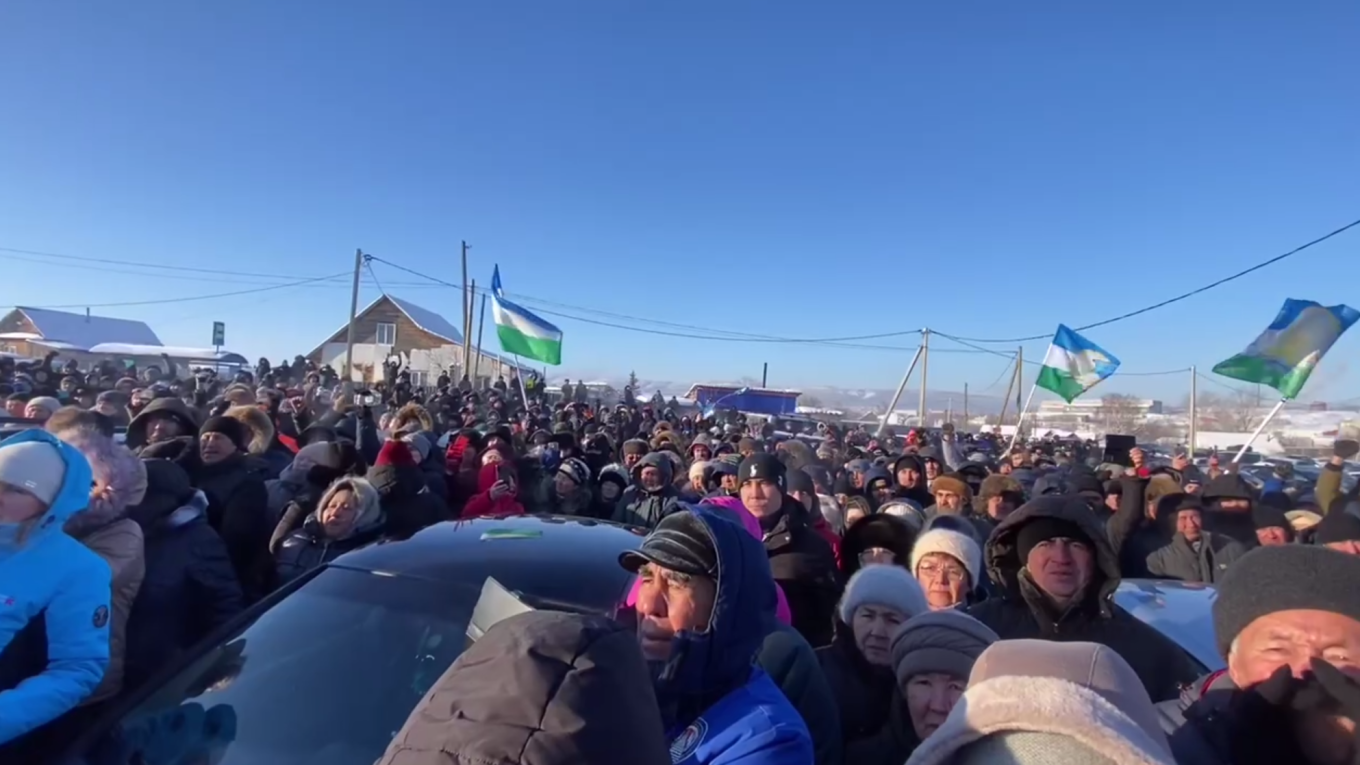
The January rallies in support of the Bashkir activist — some of the largest street protests in Russia since the Kremlin invaded Ukraine nearly two years ago — have been followed by sweeping repressions against the participants.
Alsynov attended Thursday’s closed hearing via video link from a detention center in Magnitogorsk, an industrial city in Bashkortostan’s neighboring Chelyabinsk region.
Prior to the hearing, Alsynov had called on his supporters to refrain from coming out to protest in his support near the Supreme Court building in the republic’s capital Ufa.
“There are those who say that we need to get together. Friends, no need to come [out to protest]. ... If you pray for me — that will be of great help,” the activist wrote in a letter published by his lawyer on Tuesday. “I hope that the Supreme Court will carefully study the case and that I will return to my dear children."
Alsynov’s lawyer Suyundukov echoed the sentiment expressed by his defendant in an interview released Wednesday.
“We think that the calls to gather near the Supreme Court building [in Ufa] — which are circulating on social media — come not from devoted supporters of Fayil, but from provocateurs,” Suyundukov told independent news outlet Govorit NeMoskva.
“To not put those wanting to support Fayil at risk [of detention], we ask them not to come to the court building…Fayil is not worried about himself, but he feels responsible for those arrested [at the rallies],” the lawyer added.
No gatherings were reported in Ufa or elsewhere in the republic on Thursday.
Authorities in Bashkortostan have opened at least 163 administrative cases in connection to the rallies in support of Alsynov and at least 56 residents of the republic are facing criminal prosecution, according to human rights watchdog OVD-Info.
If found guilty, arrested protesters could face up to eight years in prison on charges of participation in mass riots and committing acts of violence against law enforcement officials.
Two men facing criminal investigation, 37-year-old Rifat Dautov and 65-year-old Minniyar Bayguskarov, died under unclear circumstances earlier this year.
Among those currently under arrest are single mothers and fathers of multiple young children.
Bashkir activists and families of the arrested have launched multiple crowdfunding campaigns to help the detainees pay for independent lawyers and cover the basic needs of families left without sole breadwinners.
“Considering the escalating xenophobia in society after the terrorist attack in Moscow, we are concerned about the conditions of Fayil's detention in the colony,” said the representative of Bashqort Solidarity. “And we worry deeply about all the others arrested.”
“We want to call on the Russian anti-war opposition and everyone who considers themselves part of it, to solidarity, as the situation looks grim, given the near-total ignoring of the courts of political prisoners in 'ethnic' regions of the so-called Russian Federation and in occupied Qırım [Crimea],” the representative said.
Yet even helping those who were arrested carries risks.
Last month, Bashkir artist Tansulpan Burakayeva was forced to shut down her showroom in the center of Ufa after the landlord found out she was selling postcards with artworks by regional artists and donating the proceeds in support of the detained.
Meanwhile, families of prosecuted protesters have been reluctant to speak to the press or make statements about the fate of their loved ones, fearing publicity around their cases could inflict additional harm.
A Message from The Moscow Times:
Dear readers,
We are facing unprecedented challenges. Russia's Prosecutor General's Office has designated The Moscow Times as an "undesirable" organization, criminalizing our work and putting our staff at risk of prosecution. This follows our earlier unjust labeling as a "foreign agent."
These actions are direct attempts to silence independent journalism in Russia. The authorities claim our work "discredits the decisions of the Russian leadership." We see things differently: we strive to provide accurate, unbiased reporting on Russia.
We, the journalists of The Moscow Times, refuse to be silenced. But to continue our work, we need your help.
Your support, no matter how small, makes a world of difference. If you can, please support us monthly starting from just $2. It's quick to set up, and every contribution makes a significant impact.
By supporting The Moscow Times, you're defending open, independent journalism in the face of repression. Thank you for standing with us.
Remind me later.




